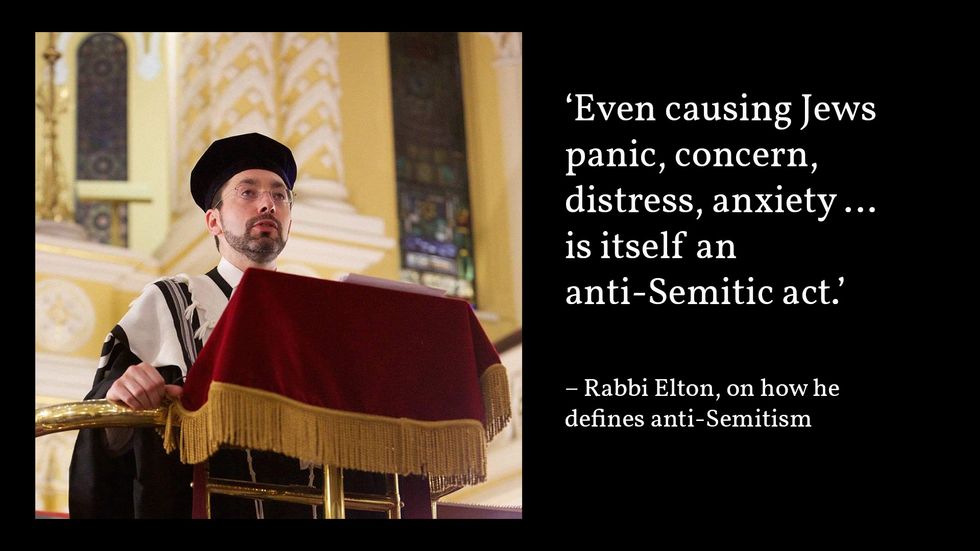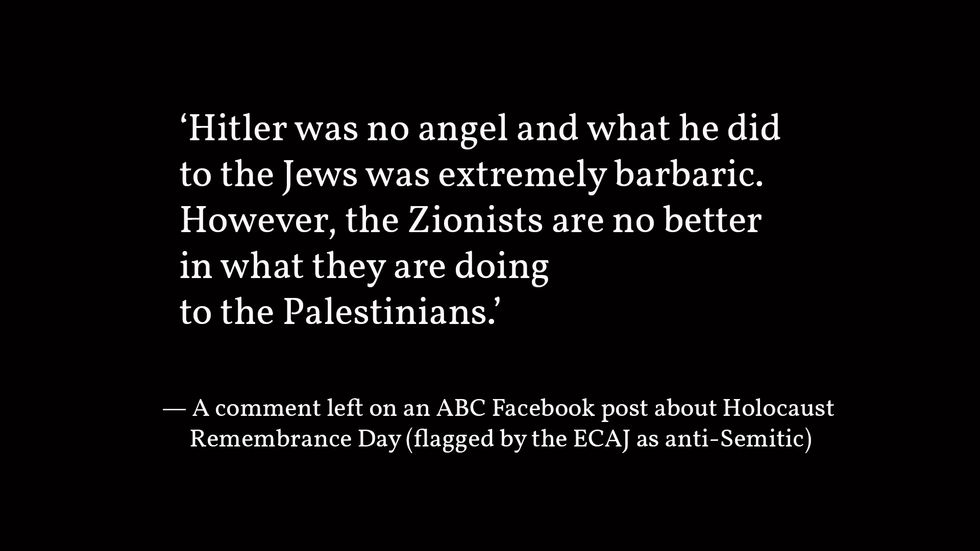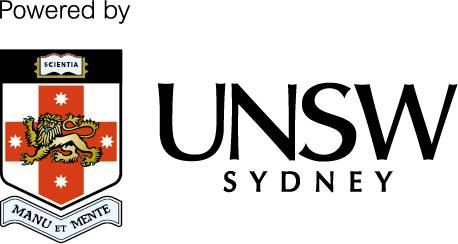Click through to Best of 2020 to discover the Newsworthy articles with greatest impact: whether by highest page views, social media engagement or reportage on important social issues.
In Australia, incidents of anti-Semitism are rising, impacting everyone from school children, to city workers to rabbis.
The singing of prayers and psalms reaches its end, the room is still and the hearts of 700 people fall weak and melancholy at the thought of what brought them to The Great Synagogue on this night.
Rabbi Dr Benjamin Elton begins his memorial address: "We gather this evening overwhelmed by grief at the loss of 11 holy souls, murdered in the worst anti-Semitic attack in the history of the United States."
Men, women and children are attired smartly and solemnly seated on rows of wooden benches. Rabbi Elton, chief minister of Sydney's Great Synagogue, stands at the pulpit draped in a formal black suit that fits his small frame. His fine features, framed by a kippah (brimless Judaic cap), carefully trimmed beard and rimless spectacles are barely discernible from the repeating pews in this house of worship marked by byzantine columns, chandeliers and a second story with more of the same.
It's October 31, 2018, four days after a gunman killed 11 Jewish congregants and injured six others at the Tree of Life synagogue in Pittsburgh, Pennsylvania.
Rabbi Elton, a firm believer that Jews be religiously commemorated as Jews when murdered at the hands of anti-Semites, had worked tirelessly over the previous few days to arrange the evening. He'd invited representatives of the State, other faith leaders – Catholic, Anglican, Muslim - and meticulously curated the evening's proceedings.
"It has shocked the world, Jews and non-Jews alike, and we are grateful for the presence of our non-Jewish friends here with us, sharing our sorrow and giving their solidarity," he said. Minutes of reflection passed and tears fell as he delivered his sobering speech, concluding with a call to "join together to create a world without hatred, without prejudice and without bloodshed. Amen."

More than one year on from Pittsburgh, the scourge of prejudice and hatred continues to plague Jewish people, both in Australia and around the world. In January this year, UN Secretary-General Antonio Guterres spoke of "a global crisis of antisemitic hatred; a constant stream of attacks targeting Jews, their institutions and property", in a speech commemorating the 75th anniversary of the liberation of the Auschwitz-Birkenau Nazi death camp.
In Australia, this "global crisis" is reflected in a rise in anti-Semitic incidents across the country. The growth of these incidents has been documented by the Executive Council of Australian Jewry (ECAJ), the national representative body for the Australian Jewish community.
In 2015 there were 190 incidents, in 2016 (210), in 2017 (230), in 2018, the year of the Pittsburgh massacre, it jumped to 366 anti-Semitic incidents. "You f---ing Jewish c---s" was screamed at a group of Jews on the streets of Melbourne. Rocks were thrown into a Jewish day school. Eggs were pegged at the front door of a Canberra synagogue. "Gas the Jews" was graffitied at the University of Sydney, along with more than 300 other counts of physical assault, vandalism, hate mail and verbal harassment.
2019 has followed in the same hostile vein with 368 reported incidents. In January The Age reported a Melbourne rabbi was told, "You should've died in Auschwitz" in a road rage incident. In February The Sydney Morning Herald wrote of the 20 swastikas graffitied across the Bondi Beach mural. In July, 9News interviewed a Jewish woman whose café had been vandalised with the text, "The Holocaust is a lie".
And in September the Herald Sun reported on the bevy of swastikas and anti-Jewish messages graffitied along a bike path in Melbourne's Eastern Suburbs – "Gas the kikes" and "F--- Jew scum" was plastered on fences and electricity boxes.
Rabbi Elton, 39, has experienced anti-Semitism firsthand. Born in England, he remembers, at the age of 17 or 18, walking through a peaceful Manchester park with his parents, a kippah on his head, when a man approached him, tore the skullcap from his head and threw it to the ground without so much as a word, "totally unprovoked … and just unpleasant".
It's a familiar tale. In February last year, three young Jewish boys in Melbourne boarded the wrong bus and were confronted by a mob of teenagers. "What would you do if I grabbed [the skull cap] off your head?" one asked, while another cursed, "Gas the Jews".
In his weekday commutes he'll disguise himself; he'll wear a hat over his kippah to avoid confrontation.
For Rabbi Elton, two decades on, he's still caught in the crosshairs of this ancient prejudice. His prominent position as a spiritual leader and teacher in the Sydney Jewish community carries an incidental exposure to a slew of otherwise furtive crimes.
The Rabbi must, as a Jewish man, pray three times a day, starting with the morning service. It's a solemn affair which he carries out in the hallowed setting of the shule (synagogue) with 10 to 15 other men. Donned in religious garb, the modest congregation sing and mumble blessings, biblical praises to God and declarations of faith.
Arriving one morning at the back entrance to the gothic-style building in Elizabeth Street in Sydney's CBD, Rabbi Elton saw two green swastikas had been spray-painted on the Pyrmont sandstone foundation stones overnight.
There are other incidents: a person defecating on the porch at the synagogue's entrance, another leaving a hoax explosive on the premises. The most recent occurrence is a peculiar one, treading the line between genuine charity and stereotyped mockery.
A gentleman, or lady, he doesn't know, has been leaving "things" at the front of The Great Synagogue. A bag of cigarettes, money, Cognac and a Grand Marnier Liqueur are the latest offerings.
The Rabbi thinks it must be "a harmless lunatic". Unphased by the prospect of tainted liquor, he handed off these gifts to some of his pupils – older men and women who attend his Wednesday night adult Jewish education class - at the synagogue.
It wasn't till the next morning in an exchange with one of the office staff (an older, shorter, pear-shaped woman with a complexion of fine crevices) that he learned the police had been scheduled to collect the items as evidence. Apparently, the police, the synagogue's private security and the Communal Security Group (CSG) had been made aware of this seemingly innocuous gesture.
Showing more concern than the Rabbi, the staffer warned: "As long as it doesn't escalate". Flashing his quick British wit, the Rabbi quipped, "You mean larger bottles of whiskey?"
****
WHAT constitutes anti-Semitism has changed over the centuries. Jerome A. Chanes posits six evolutionary stages of anti-Semitism in his book Antisemitism: A Reference Handbook. The first stage is the ethnically predicated "pre-Christian anti-Jewish activity in the ancient Greco-Roman world" – going as far back as the 8th BCE. The Middle Ages brought the second stage, the classic Christian anti-Semitism. Three transmutations later, and history produced the racial anti-Semitism of the 19th century, leading to the foundation of Nazism in the early 20th century. Chanes calls his contemporary sixth evolutionary stage the New Antisemitism, complete with an excoriation of Zionism, equating the movement for a Jewish homeland with racism.
As incidents of anti-Semitism continue to rise around the world, a "working definition" of anti-Semitism has emerged: "…a certain perception of Jews, which may be expressed as hatred toward Jews. Rhetorical and physical manifestations of antisemitism are directed toward Jewish or non-Jewish individuals and/or their property, toward Jewish community institutions and religious facilities."
The ECAJ, which uses this definition to inform its annual incident report, said the "working definition" had become the most widely accepted definition after its adoption by the International Holocaust Remembrance Alliance in 2016.
Rabbi Elton's own definition is more subjective, believing "even causing Jews panic, concern, distress, anxiety … is itself an anti-Semitic act."
However, he does not conflate anti-Zionism with anti-Semitism. "It's very important that we don't suggest that anyone who criticises … Israel is anti-Semitic, that's not the case.
"I think it's probably possible to be anti-Zionist in the sense that you don't think there should be a Jewish state without being an anti-Semite.
"But it's definitely true that contemporary anti-Zionism when its condemnations are so disproportionate and uses tropes like Jews drinking blood, Jews killing babies, which are old established anti-Semitic tropes… [it's] a cover, either conscious or unconscious, for old-fashioned anti-Semitism."
In the face of hostility, both personally endured and publicly reported, the Australian Jewish community has fortified itself, and then some.
Dr Simon Holloway, an education officer at the Sydney Jewish Museum in Darlinghurt, spends his workdays shrouded in Kremlin-esque security measures.
The three-storey building, with a facade of grey-painted brick, looms over the street. The upper windows are screened in grey to block the curious eye. At street level, three street-side underbites of metal bollard teeth guard the entrance to the building from the road. Six cameras track pedestrians as they cross the building's frontage.
The visitor entrance to the museum is a small rectangular brick antechamber that juts out from the façade, fronted by bulletproof glass doors. The left side reads: "ENTRY", the right reads: "EXIT". Each side is an airlocked compartment where an intercom screening process and bag check takes place. Behind the entry stands an armed guard, clad in head-to-toe black, employed by Challenger Security, the company contracted by many Australian Jewish institutions.
The Great Synagogue uses the same airlocked vetting process for its rear entrance, along with surveillance cameras and a Challengerguard.
In September 2018, newly-minted Prime Minister Scott Morrison lamented this confronting reality on ABC Radio.
"When I go to church on a Sunday, I don't need security guards outside my church … [but] that's the reality for Jewish Australians and I just think that's appalling. [...] I'm used to seeing security guards outside synagogues. As a person of faith, the idea that you have to have security guards outside your places of worship, that really grieves me, but I understand why it's necessary."
Dr Holloway, 40, works behind these barricades most days. Whether giving a Holocaust seminar for a group of high school students or facilitating a meeting with a Holocaust survivor, he's always surrounded by an excess of protection.
To date Dr Holloway has encountered anti-Semitism only once: as a boy, walking home from his Jewish high school though he can't even recall the slur.
"So, it's not like anti-Semitism [has] really been a thing with which I've dealt", it's always a thing I've heard has happened to somebody else. Even so, as a religious Jew – a frequenter of an orthodox synagogue, a keeper of kashrut (Jewish dietary laws), and an observer of Jewish holidays – he finds it necessary to take precautions in his personal life.
In his weekday commutes to and from work, he'll disguise himself; he'll wear a hat over his kippah to avoid confrontation. Rabbi Elton does the same. Holloway doesn't believe by wearing a kippah he'll find himself "a victim of violent assault or anything horrible like that".
He said it's the concern that "even just somebody saying something unpleasant to me is just enough to, you know, ruin my afternoon".
****
MOUNT Sinai, a Jewish day school in Maroubra, a place of learning for Holloway's four-year-old daughter and where Rabbi Elton plans to send his children, is, like the Sydney Jewish Museum, a fortress.
At the front of the school there is an arrangement of heavy caramel boulders forming a kind of natural bollard. In clear view is the ubiquitous armed Challenger guard in black. Behind him, a less conspicuous volunteer with a walkie talkie, spotting loiterers (like me) and asking them to move on or he'll call the police.
All parents are rightly alert to their children's safety but an incident in 2014 where Jewish children as young as five were vilified by a group of teenagers who boarded their school bus jolted parents in the community.
In October 2019, the Federal government gave $5.7 million to the Jewish community of the Eastern Suburbs for purpose of boosting security "following disturbing outbreaks of antisemitism".
This focus on maintaining defences is born of the "never again" ethos of Holocaust survivors and ongoing experiences of anti-Semitism for Australia's Jewish citizens.
****
IN LATE 2016, the emergence of a group called Antipodean Resistance, self-described neo-Nazis and white supremacists, rang alarm bells in the Jewish community, jarring their psyche. By January 2018, the hate group claimed to have 300 members across the country, largely men in their late teens and twenties. In line with their veneration for Hitler, Antipodean Resistance have repeatedly plastered offensive posters, painted murals, and graffitied public spaces, all to the effect of demonising Jews, demanding their execution, blaming them for non-white immigration and calling for a "White Revolution". The University of Sydney has been one of their preferred targets of propaganda. Their neo-Nazi inspired catchphrase reads: "We're the Hitlers you've been waiting for."
While the group's activity has so far been constrained to propaganda posters, Julie Nathan, Research Officer for the ECAJ, said "the real danger is in its propensity for violence … its connections overseas to proscribed terrorist groups and in the publications it promotes."
They are not alone. Lads Society, another anti-Semitic, white supremacist, pro-Nazi group recently sought to infect the fabric of Australian polity with their ugly ideology. In 2018, members of the group successfully "infiltrated" the NSW Young Nationals. The ECAJ saw it as an attempt to "subvert established centre-right parties and move their policy positions to the far right".
Antipodean Resistance and Lads society, along with the myriad of other anti-Semitic hate groups around the world, are a testament to the conviction that there still exist people, attempting to mobilise a likeminded cohort, that, as Daniel J. Goldhagen, author of Hitler's Willing Executioners, puts it, see the Jew "not just benignly different but malevolent and corrosive".
The unlikely appointment of Fraser Anning to the Australian Senate saw him reference "the final solution" in his maiden speech to the chamber. He has since been photographed attending far right rallies.
Then prime minister Malcolm Turnbull was quick to condemn him. "The reference to the 'final solution' in that speech was appalling. We condemn that and the insult it offered to the memory of those Jewish martyrs, just as we condemn the racism, a shocking rejection of the Australian values that have made us the successful multicultural nation that we are today."
****
IN LIGHT of this resurgent hatred, Mendel Sufrin, an adherent of Chabad-Lubavitch (an orthodox Jewish movement), could be forgiven for keeping a low profile. Instead, he refuses to let anti-Semitism dictate the expression of his piety.
The loquacious 15-year-old invariably wears religious garb, proudly and conspicuously. "The whole point of Chabad is to show that we're not actually scared to be Jewish."
Even walking the streets of the CBD, completing his weekly round of Jewish outreach – visiting less observant Jews in business offices to don them in Judaic dress and offer them some semblance of Jewish connection – Sufrin cloaks himself in a scripturally dictated black wide-brimmed fedora, dark suit jacket and tzitzit (an undershirt with knotted ritual fringes).
This observance has come at a price, with abuse ("F--- the Jews") and political commentary ("Get your brothers out of Palestine") shouted at him from cars as he walks the streets. He is unphased by the attention. "If we start making ourselves blend in with surroundings, that shows that they're succeeding.
"Look at what happened to Hitler, he's now long gone. The Romans, the Greeks, they're all gone … they tried destroying the Jews and the Jews just stay on.
"They tried to destroy us, and we've gone past them."
****
IT'S A Thursday, Rabbi Elton exits through the back entrance of The Great Synagogue. On the city street his royal blue suit blends into the aesthetic of the business men and women scurrying about on their lunch break. His kippah is hidden under a stylish pin-striped fedora. He's on his way to the Montefiore nursing home in Randwick. It's part of his pastoral role to visit members of the shule.
As he reaches the first cross street he's greeted with a familiar face. John is a vendor for The Big Issue (an independent magazine) whom the Rabbi had first met some five months earlier. He's a tall, skinny, balding fellow in an Iron Maiden shirt. He's always on the same street corner, not every day, but when the two meet Rabbi Elton makes it his business to buy from him.
As the two fall into conversation, John begins an anecdote, telling the Rabbi how he had pushed back against a Jewish stereotype when someone said to him they were surprised that Rabbi Elton, being a Jew, went out of his way to regularly pay $9 for the magazine.
He tells the Rabbi that he had defended him in saying: "Hey, Jews do spend money, it's not like they just sit with it in their bank."
John explains: "I don't think it's acceptable to judge people based on things like the way they're born or the culture they're born into."
The exchange is forced to a close by the green crossing light. Rabbi Elton, starting to move forward with the shuffling crowd, looks back to John and says, "we do get some victories".
* Podcast by Kellie Highet, Verina Gading and Tabitha Wilson




Cultural ping pong: Dancing on the edge of two worlds